Itinerary
The capital of Dutch St. Maarten stretches about a mile (1½ km) along an isthmus between Great Bay and the Salt Pond and has five parallel streets. Most of the village’s dozens of shops and restaurants are on Front Street, narrow and cobblestone, closest to Great Bay. It’s generally congested when cruise ships are in port, because of its many duty-free shops and several casinos. Little lanes called steegjes connect Front Street with Back Street, which has fewer shops and considerably less congestion. Along the beach is a ½-mile-long (1-km-long) boardwalk with restaurants and several Wi-Fi hot spots.Wathey Square (pronounced watty) is in the heart of the village. Directly across from the square are the town hall and the courthouse, in a striking white building with cupola. The structure was built in 1793 and has served as the commander’s home, a fire station, a jail, and a post office. The streets surrounding the square are lined with hotels, duty-free shops, restaurants, and cafés. The Captain Hodge Pier, just off the square, is a good spot to view Great Bay and the beach that stretches alongside.
Day itinerary:
Pastel-colored buildings and shops filled with tempting souvenirs herald your arrival to bustling Philipsburg. Situated near the harbor on the Dutch side of St. Maarten, Philipsburg owes its discovery to Christopher Columbus in 1493. Today, celebrated Front Street is home to a number of local Creole restaurants as well as jewelry stores, stylish boutiques, and lively casinos for visitors seeking an upbeat island experience.
Day itinerary:
Arrive at the boardwalk of Pusser’s Landing and mingle with other yachtsmen in the utterly charming marina at Soper’s Hole. Find a deserted stretch of beach to kick back and ponder this tiny port’s rich heritage of romance, pirates, and adventure. An evening departure features a once-in-a-lifetime romantic sunset Sail Away.
Jost Van Dyke, four miles long, is truly known as the ‘barefoot island’. The smallest of the British Virgin Islands, it is known as a popular destination for yachts and is celebrated for its casual lifestyle, protected anchorages, fine beaches and beachfront restaurants and bars. The island has fewer than 200 inhabitants and they are widely known as a welcoming people. The island’s name conjures up its rich, colorful past. Jost Van Dyke is said to have been named for an early Dutch settler, a former pirate. At Great Harbour, Little Harbour, and White Bay there are safe, protected bays and pristine beaches shaded with coconut palms and seagrape trees. Discover inviting shops selling local treasures, restaurants, and bars. ‘The Painkiller’, one of the Caribbean’s most popular drinks, originated at the Soggy Dollar Bar. Foxy’s and Gertrude’s in White Bay are renowned for drinks made with the island’s famous rum, frosty beers, and tales of pirates and sunken treasure. Explore Jost Van Dyke’s history in the vegetation-covered ruins of centuries-old sugar mills, or on the old trails that crisscross the island. Revel in the natural beauty of the pristine, untouched beaches. Hike up to the highest spot on the island, Majohnny Point, and take in a stunning 360 degree view of the Caribbean. Relax in the natural ‘bubble pool’, a popular tourist attraction. Jost Van Dyke conjures up images of what the British Virgin Islands may have looked like many years ago.
Day itinerary:
For an island comprised of a mere eight square miles, it’s amazing how much there is to do on Jost Van Dyke. Visit the national park on nearby Diamond Cay, snorkel among swaying sponges and angelfish at Sandy Spit, or pilot your own boat around Sir Francis Drake Waterway. After all that, you’ll be ready for an evening drink on the beach — where you can admire your Windstar ship aglow in the harbor.
Jost Van Dyke, four miles long, is truly known as the ‘barefoot island’. The smallest of the British Virgin Islands, it is known as a popular destination for yachts and is celebrated for its casual lifestyle, protected anchorages, fine beaches and beachfront restaurants and bars. The island has fewer than 200 inhabitants and they are widely known as a welcoming people. The island’s name conjures up its rich, colorful past. Jost Van Dyke is said to have been named for an early Dutch settler, a former pirate. At Great Harbour, Little Harbour, and White Bay there are safe, protected bays and pristine beaches shaded with coconut palms and seagrape trees. Discover inviting shops selling local treasures, restaurants, and bars. ‘The Painkiller’, one of the Caribbean’s most popular drinks, originated at the Soggy Dollar Bar. Foxy’s and Gertrude’s in White Bay are renowned for drinks made with the island’s famous rum, frosty beers, and tales of pirates and sunken treasure. Explore Jost Van Dyke’s history in the vegetation-covered ruins of centuries-old sugar mills, or on the old trails that crisscross the island. Revel in the natural beauty of the pristine, untouched beaches. Hike up to the highest spot on the island, Majohnny Point, and take in a stunning 360 degree view of the Caribbean. Relax in the natural ‘bubble pool’, a popular tourist attraction. Jost Van Dyke conjures up images of what the British Virgin Islands may have looked like many years ago.
Day itinerary:
For an island comprised of a mere eight square miles, it’s amazing how much there is to do on Jost Van Dyke. Visit the national park on nearby Diamond Cay, snorkel among swaying sponges and angelfish at Sandy Spit, or pilot your own boat around Sir Francis Drake Waterway. After all that, you’ll be ready for an evening drink on the beach — where you can admire your Windstar ship aglow in the harbor.
Day itinerary:
The beautiful Bank Barrier coral reef wavers just beneath you as your ship makes the break to the bird sanctuary of Prickly Pear Island, so named because it is dotted with prickly pear cacti. Althought uninhabited, it does have a beach bar and water sports facilities. Not far away lies the curious assembly of house-sized boulders called “The Baths,” which form huge underground pools and caverns
You can easily explore all of Gustavia during a two-hour stroll. Some shops close from noon to 3 or 4, so plan lunch accordingly, but stores stay open past 7 in the evening. Parking in Gustavia is a challenge, especially during vacation times. A good spot to park is rue de la République, alongside the catamarans, yachts, and sailboats.
Day itinerary:
Affectionately known as St. Barts, the Caribbean’s most chic island adds a French flair to Riviera-like beaches and duty-free boutiques. Walk past gingerbread cottages in search of celebrities, shop for designer fashions, or sip the island’s signature ti punch as kite surfers fly by.
Day itinerary:
With its protected shoreline, calm surf, spectacular coral reefs and sugar-soft beaches, Road Bay has become a destination for boaters, with its delightful restaurants, bars, and shops. Anguilla has some of the most beautiful sunsets and delicious rum punch to be found in the Caribbean. It is also home to Cuban tree frogs, red-footed tortoise, green iguanas and five species of bats. Worth checking out is Wallblake House, a heritage plantation house and museum said to be the oldest building on the island and located nearby.
The British colonial influence is everywhere in pretty English Harbour. And yet, located on Antigua’s south coast, you are just minutes away from some of the loveliest beaches in the Caribbean. With its long ribbons of white sandy shores including the superbly named Rendez-Vous Bay Beach, the cold English drizzle and chimes of big ben have never been farther away! English Harbour is how the Caribbean is meant to be. Beautifully restored, the area still retains much in the way of its rich historic past. Nelson’s dockyard is absolutely not to be missed; a working dockyard that dates from the 18th century, this is part of a larger UNESCO World Heritage Site (Nelson’s Dockyard and National Park) which also contains Clarence House and Shirley Heights. Perhaps one of the best examples of British colonial development, the dockyard is named after the famous Admiral who lived on the island in the 1780’s. The fascinating naval history is palpable in all the buildings of this historic site and just a little further along you find beautifully restored warehouses that are now home to enchanting restaurants, art galleries, boutiques and hotels, all proudly stating their historic credentials on prominent, easy to read signs. Venturing beyond the “town” and you’ll find nature trails for all levels of fitness. Famous for having 365 different beaches, it is unsurprising then that a lot of Antiguan life takes place on its sandy shores. Beaches here offer all things to everyone so whether you want to rekindle the romance, indulge in some adrenaline fueled water sports, swim, snorkel or sail your way around the island, you’re sure to find you’re your own personal paradise here.
Day itinerary:
It’s said that Antigua has 365 beaches – one for every day of the year. See how many you can discover as our stay in port stretches into the evening to accommodate them all. Watch the stars come out as darkness falls and imagine how residents of Andromeda must envy you.
The capital of Dutch St. Maarten stretches about a mile (1½ km) along an isthmus between Great Bay and the Salt Pond and has five parallel streets. Most of the village’s dozens of shops and restaurants are on Front Street, narrow and cobblestone, closest to Great Bay. It’s generally congested when cruise ships are in port, because of its many duty-free shops and several casinos. Little lanes called steegjes connect Front Street with Back Street, which has fewer shops and considerably less congestion. Along the beach is a ½-mile-long (1-km-long) boardwalk with restaurants and several Wi-Fi hot spots.Wathey Square (pronounced watty) is in the heart of the village. Directly across from the square are the town hall and the courthouse, in a striking white building with cupola. The structure was built in 1793 and has served as the commander’s home, a fire station, a jail, and a post office. The streets surrounding the square are lined with hotels, duty-free shops, restaurants, and cafés. The Captain Hodge Pier, just off the square, is a good spot to view Great Bay and the beach that stretches alongside.
Day itinerary:
Pastel-colored buildings and shops filled with tempting souvenirs herald your arrival to bustling Philipsburg. Situated near the harbor on the Dutch side of St. Maarten, Philipsburg owes its discovery to Christopher Columbus in 1493. Today, celebrated Front Street is home to a number of local Creole restaurants as well as jewelry stores, stylish boutiques, and lively casinos for visitors seeking an upbeat island experience.
Mountainous St. Kitts, the first English settlement in the Leeward Islands, crams some stunning scenery into its 65 square miles (168 square km). Vast, brilliant green fields of sugarcane (the former cash crop, now slowly being replanted) run to the shore. The fertile, lush island has some fascinating natural and historical attractions: a rain forest replete with waterfalls, thick vines, and secret trails; a central mountain range dominated by the 3,792-foot Mt. Liamuiga, whose crater has long been dormant; and Brimstone Hill, known in the 18th century as the Gibraltar of the West Indies. St. Kitts and Nevis, along with Anguilla, achieved self-government as an associated state of Great Britain in 1967. In 1983 St. Kitts and Nevis became an independent nation. English with a strong West Indian lilt is spoken here. People are friendly but shy; always ask before you take photographs. Also, be sure to wear wraps or shorts over beach attire when you’re in public places.
Day itinerary:
With Georgian architecture situated against an irresistible backdrop of emerald green hills, Basseterre is one of the loveliest of the Caribbean’s small capitals. Beyond town, more than a quarter of St. Kitts has been set aside as Brimstone Hill Fortress national Park, a UNESCO World Heritage Site.
You can easily explore all of Gustavia during a two-hour stroll. Some shops close from noon to 3 or 4, so plan lunch accordingly, but stores stay open past 7 in the evening. Parking in Gustavia is a challenge, especially during vacation times. A good spot to park is rue de la République, alongside the catamarans, yachts, and sailboats.
Day itinerary:
Affectionately known as St. Barts, the Caribbean’s most chic island adds a French flair to Riviera-like beaches and duty-free boutiques. Walk past gingerbread cottages in search of celebrities, shop for designer fashions, or sip the island’s signature ti punch as kite surfers fly by.
Day itinerary:
Today we visit “Pompeii of the Caribbean”—an island that is half lush and green, half gray and covered in ash by a volcano in 1995. And if a half-buried city isn’t intriguing enough, there are black-sand beaches and a perplexing Irish heritage to explore.
This small group of islands lies opposite the western part of Guadeloupe. They were discovered in November 1493 by Columbus, who named them Los Santos. French settlers established themselves in 1648 and changed the name to Iles des Saintes, commonly known as Les Saintes. Since then the islands have been closely connected with Guadeloupe. Until a recent influx of tourism, Les Saintes were among the Caribbean’s most unspoiled destinations. Only two of the eight islands are inhabited: Terre-de-Bas and Terre-de-Haut. The latter is known for its impressive Fort Napoleon built in the early 19th century to replace an earlier 17th-century fort. From its vantage point there are fine views of the many tiny islets scattered in the bay and across to Guadeloupe. Terre-de-Haut is the main island of Les Saintes, with steeply scarped hills, scenic valleys, hidden coves and beautiful beaches. Its main settlement consists of a charming village of red-roofed houses situated along a curving bay. A number of small boutiques and gift shops invite browsing. Quaint cafés and restaurants offer food and drink. To the east of the village lies Grande Anse, a fine sand beach. Most of the attractions on this small island can be seen on foot. With just a few vehicles on the island, there are no organized tours possible. Time ashore here is at your leisure.
Day itinerary:
This is the Caribbean as you’ve always imagined it, with yacht-filled harbors set against volcanic mountains and endless stretches of palm-fringed beach. The underwater world here attracted the likes of Jacques Cousteau, but even novice snorkelers will enjoy exploring these impossibly blue waters.
Although it’s one of the smallest capitals in the Caribbean, Roseau has the highest concentration of inhabitants of any town in the eastern Caribbean. Caribbean vernacular architecture and a bustling marketplace transport visitors back in time. Although you can walk the entire town in about an hour, you’ll get a much better feel for the place on a leisurely stroll. For some years now, the Society for Historical Architectural Preservation and Enhancement (SHAPE) has organized programs and projects to preserve the city’s architectural heritage. Several interesting buildings have already been restored. Lilac House, on Kennedy Avenue, has three types of gingerbread fretwork, latticed verandah railings, and heavy hurricane shutters. The J.W. Edwards Building, at the corner of Old and King George V sreets, has a stone base and a wooden second-floor gallery. The Old Market Plaza is the center of Roseau’s historic district, which was laid out by the French on a radial plan rather than a grid, so streets such as Hanover, King George V, and Old radiate from this area. South of the marketplace is the Fort Young Hotel, built as a British fort in the 18th century; the nearby statehouse, public library, and Anglican cathedral are also worth a visit. New developments at the bay front on Dame M.E. Charles Boulevard have brightened up the waterfront.
Day itinerary:
Get ready for a full day with plenty to do. Snorkel alongside brilliant parrot fish in the bubbly waters of Champagne Beach. Take a break to enjoy more than 150 species of plants and brilliant red-necked Jaco parrots at the botanical gardens. If you’re up for an optional hike, don’t miss Boiling Lake and the Valley of Desolation at Dominica’s Morne Trois Pitons National Park, a UNESCO World Heritage Site.
Day itinerary:
The UNESCO site Pitons’ with their two majestic volcanic peaks and 24 miles of vibrant coral reef welcome you to St. Lucia. Nearby Pigeon Island National Park features impressive ruins of English forts, archaeological relics of Arawak Indians, and splendid beaches.
Located beside the island’s only natural harbour, the capital of Barbados combines modern and colonial architecture with glorious palm tree-lined beaches and a number of historical attractions. Experience the relaxed culture of the city renowned for its British-style parliament buildings and vibrant beach life, and seek out the Anglican church and the 19th-century Barbados Garrison. The distance between the ship and your tour vehicle may vary. This distance is not included in the excursion grades.
Day itinerary:
Jolly old England comes to life in the city and its garrison, both UNESCO World Heritage Sites. Further afield, you’ll find historic sugar plantations and the fairyland magic of Harrison’s Cave.
Day itinerary:
Today we visit “Pompeii of the Caribbean”—an island that is half lush and green, half gray and covered in ash by a volcano in 1995. And if a half-buried city isn’t intriguing enough, there are black-sand beaches and a perplexing Irish heritage to explore.
This small group of islands lies opposite the western part of Guadeloupe. They were discovered in November 1493 by Columbus, who named them Los Santos. French settlers established themselves in 1648 and changed the name to Iles des Saintes, commonly known as Les Saintes. Since then the islands have been closely connected with Guadeloupe. Until a recent influx of tourism, Les Saintes were among the Caribbean’s most unspoiled destinations. Only two of the eight islands are inhabited: Terre-de-Bas and Terre-de-Haut. The latter is known for its impressive Fort Napoleon built in the early 19th century to replace an earlier 17th-century fort. From its vantage point there are fine views of the many tiny islets scattered in the bay and across to Guadeloupe. Terre-de-Haut is the main island of Les Saintes, with steeply scarped hills, scenic valleys, hidden coves and beautiful beaches. Its main settlement consists of a charming village of red-roofed houses situated along a curving bay. A number of small boutiques and gift shops invite browsing. Quaint cafés and restaurants offer food and drink. To the east of the village lies Grande Anse, a fine sand beach. Most of the attractions on this small island can be seen on foot. With just a few vehicles on the island, there are no organized tours possible. Time ashore here is at your leisure.
Day itinerary:
This is the Caribbean as you’ve always imagined it, with yacht-filled harbors set against volcanic mountains and endless stretches of palm-fringed beach. The underwater world here attracted the likes of Jacques Cousteau, but even novice snorkelers will enjoy exploring these impossibly blue waters.
Although it’s one of the smallest capitals in the Caribbean, Roseau has the highest concentration of inhabitants of any town in the eastern Caribbean. Caribbean vernacular architecture and a bustling marketplace transport visitors back in time. Although you can walk the entire town in about an hour, you’ll get a much better feel for the place on a leisurely stroll. For some years now, the Society for Historical Architectural Preservation and Enhancement (SHAPE) has organized programs and projects to preserve the city’s architectural heritage. Several interesting buildings have already been restored. Lilac House, on Kennedy Avenue, has three types of gingerbread fretwork, latticed verandah railings, and heavy hurricane shutters. The J.W. Edwards Building, at the corner of Old and King George V sreets, has a stone base and a wooden second-floor gallery. The Old Market Plaza is the center of Roseau’s historic district, which was laid out by the French on a radial plan rather than a grid, so streets such as Hanover, King George V, and Old radiate from this area. South of the marketplace is the Fort Young Hotel, built as a British fort in the 18th century; the nearby statehouse, public library, and Anglican cathedral are also worth a visit. New developments at the bay front on Dame M.E. Charles Boulevard have brightened up the waterfront.
Day itinerary:
Get ready for a full day with plenty to do. Snorkel alongside brilliant parrot fish in the bubbly waters of Champagne Beach. Take a break to enjoy more than 150 species of plants and brilliant red-necked Jaco parrots at the botanical gardens. If you’re up for an optional hike, don’t miss Boiling Lake and the Valley of Desolation at Dominica’s Morne Trois Pitons National Park, a UNESCO World Heritage Site.
Day itinerary:
Martinique offers a delightful and distinctive blend of French and Caribbean influences, with a bounty of historical sites, museums and a wide array of excellent shopping. Be sure to take a tour of the beautiful Jardin de Balata Botanical Gardens with exotic plants from around the world and a treetop walkway affording mountain views.
Day itinerary:
The UNESCO site Pitons’ with their two majestic volcanic peaks and 24 miles of vibrant coral reef welcome you to St. Lucia. Nearby Pigeon Island National Park features impressive ruins of English forts, archaeological relics of Arawak Indians, and splendid beaches.
Located beside the island’s only natural harbour, the capital of Barbados combines modern and colonial architecture with glorious palm tree-lined beaches and a number of historical attractions. Experience the relaxed culture of the city renowned for its British-style parliament buildings and vibrant beach life, and seek out the Anglican church and the 19th-century Barbados Garrison. The distance between the ship and your tour vehicle may vary. This distance is not included in the excursion grades.
Day itinerary:
Jolly old England comes to life in the city and its garrison, both UNESCO World Heritage Sites. Further afield, you’ll find historic sugar plantations and the fairyland magic of Harrison’s Cave.
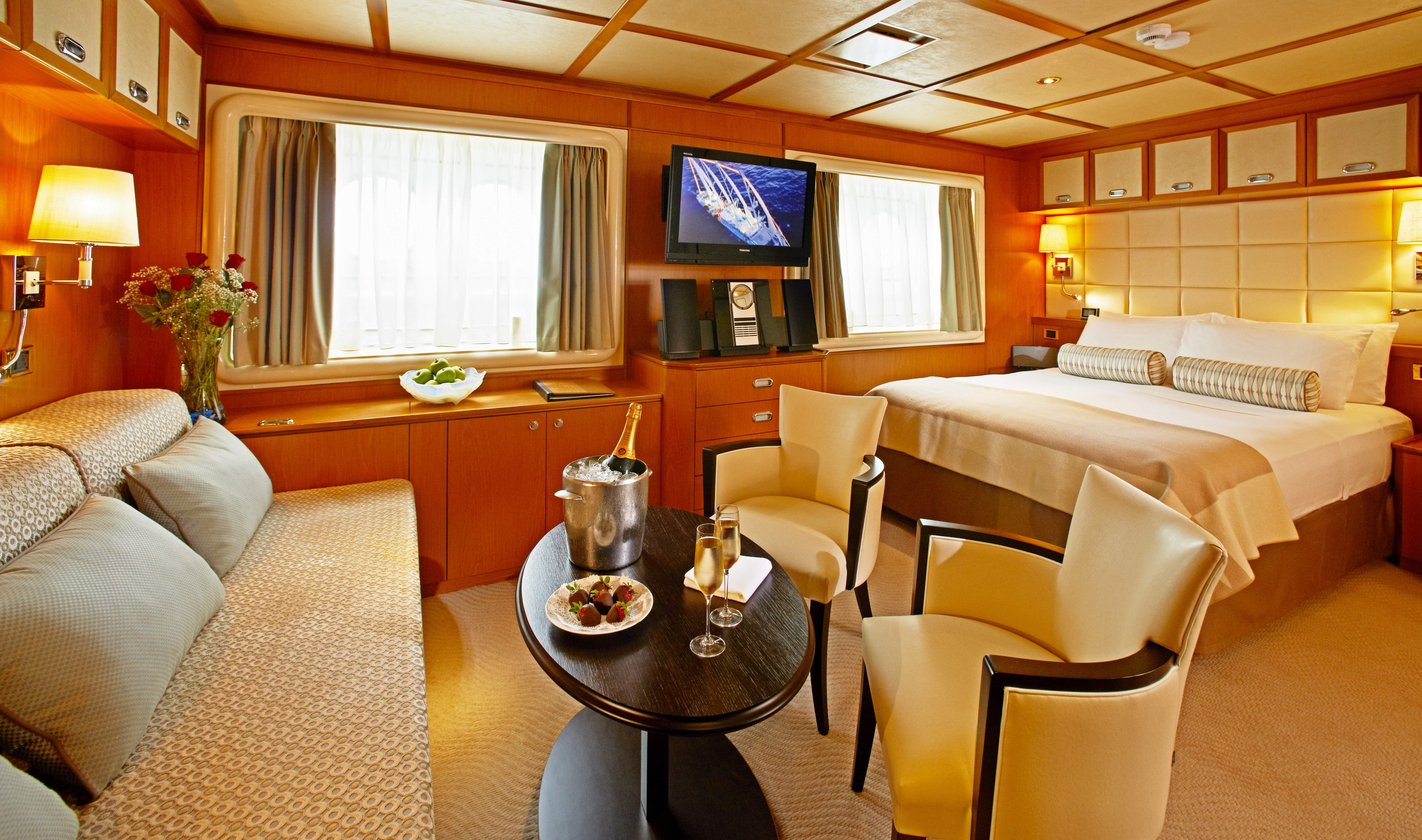
With an expansive 220 square feet, the Owner’s Suite gives you everything offered in a stateroom, plus lots more, including a beautiful sitting area and separate in-room dining space.
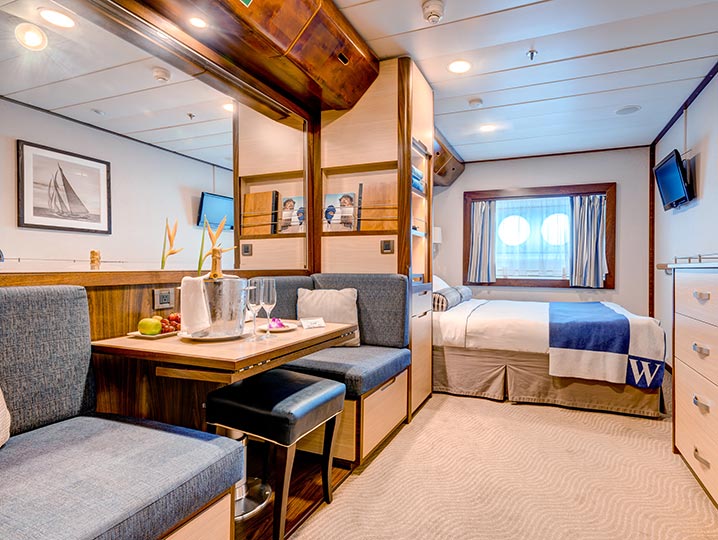
Every inch of your stateroom is designed for comfort. Luxurious Egyptian cotton linens wrap you in pleasant sleepiness as you stretch out in your queen bed (can be separated into twins if you prefer). Your spacious bath features granite counter tops, ample storage, and a roomy shower with massage shower head. L’Occitane® bath products invite you to indulge, while comfy waffle-weave robe and slippers entice you to relax. You’ll find fresh fruit and flowers always waiting for you after a day of sun or sightseeing. And, of course, everything else you need and expect — flat-screen television and DVD, private safe. And always at your fingertips, anything you wish from room service.
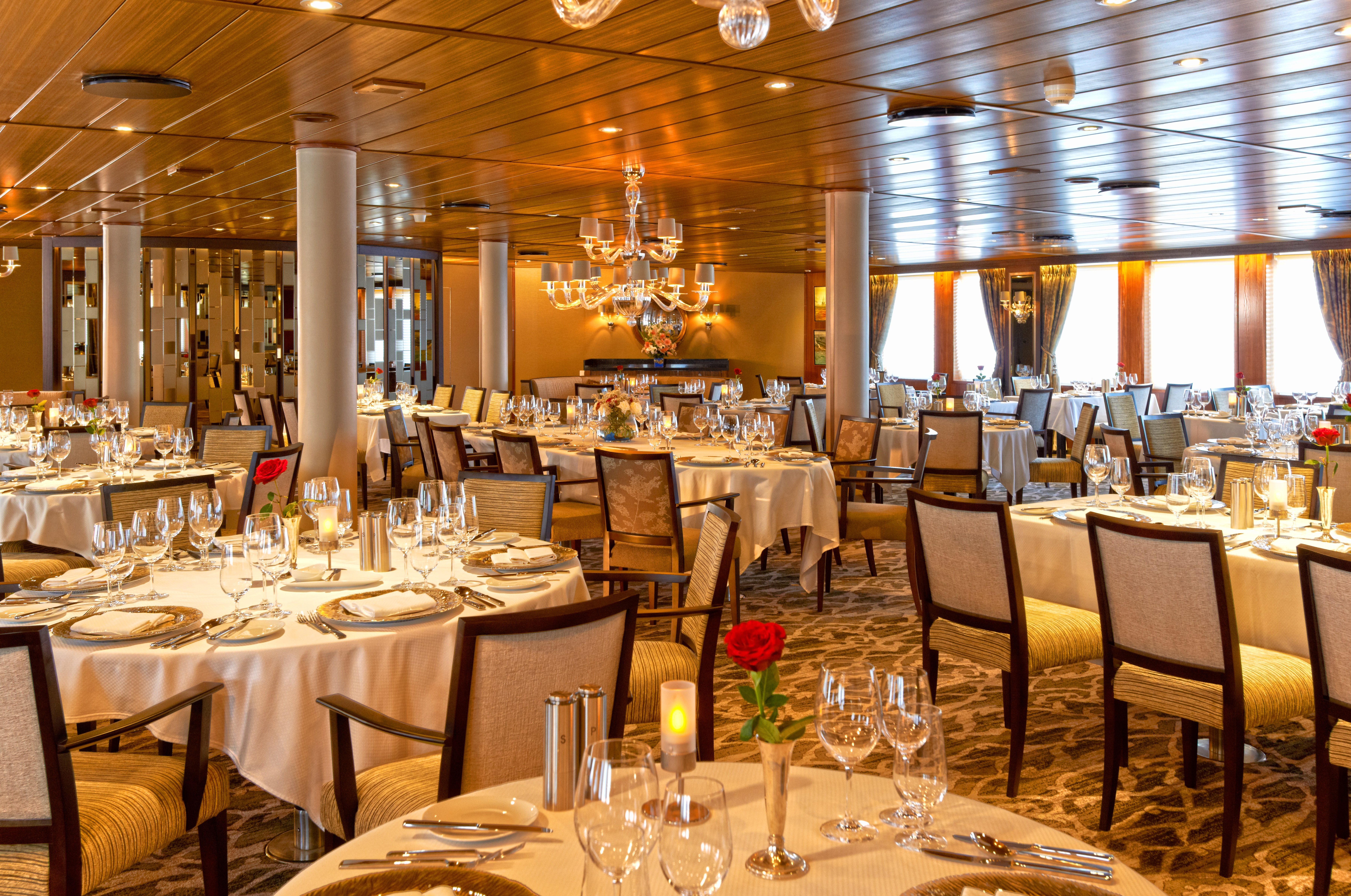
Here, the dining room manager seats you, but where is your decision. There are no pre-assigned tables or first or second seatings. When you dine and with whom are entirely up to you. Seating usually begins at 6:30 p.m. and will be printed in the ship’s daily program. Each delightful dish is prepared exactly to your liking – an exquisite dinner served course-by-course with a fine selection of vintage wines.
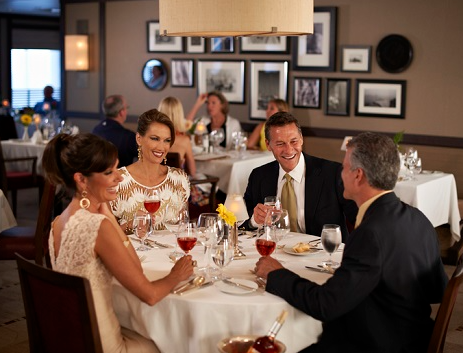
Treat your palate to the French-inspired café cuisine of Stella Bistro, Wind Surf’s alternative restaurant. You’ll find delightfully indulgent desserts and a wonderful array of wines specifically paired to the meal.
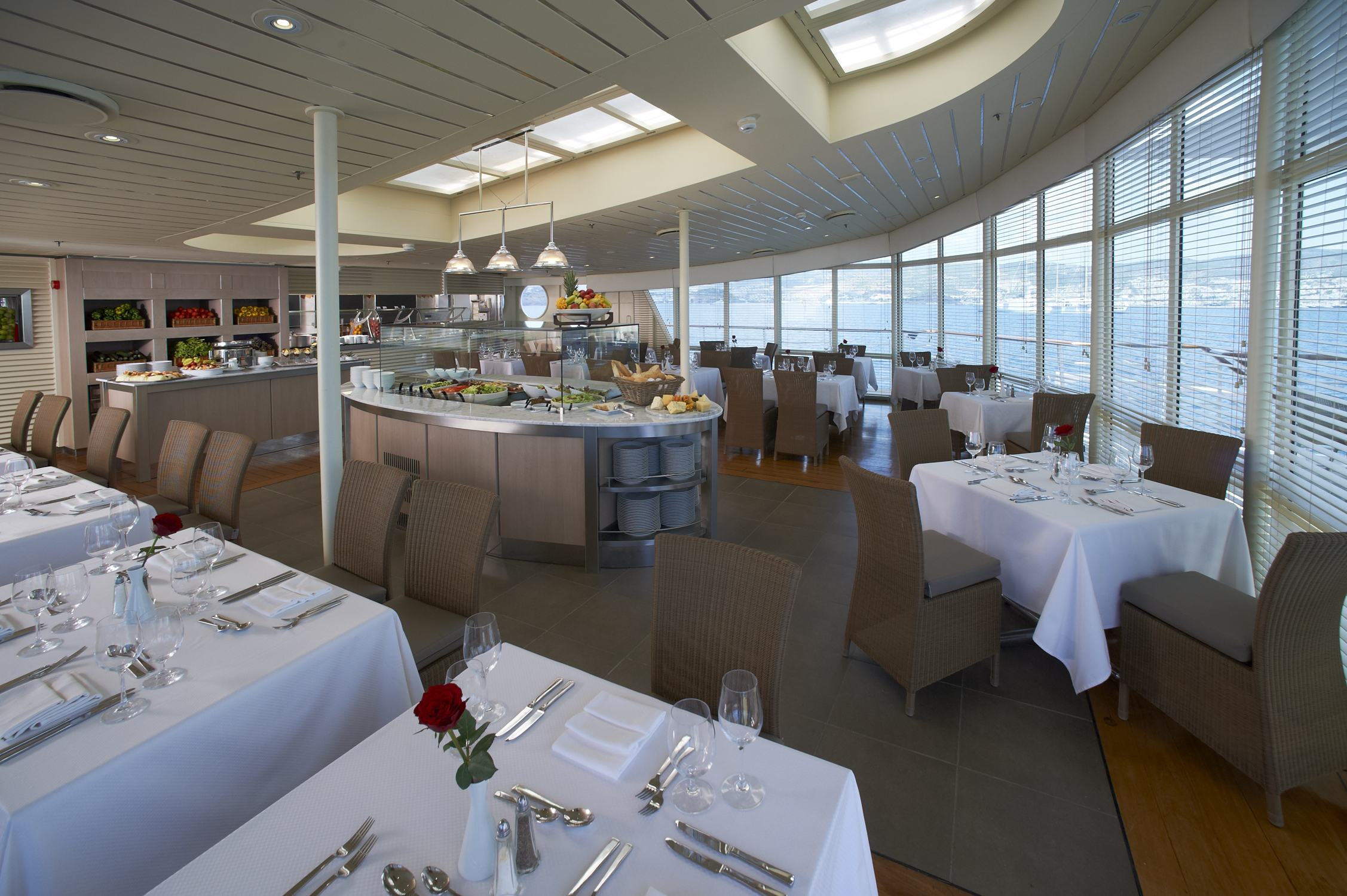
It’s breakfast alfresco, full service or buffet-style, anytime till 9:30 a.m. No need to hurry. Again, the choices are many in Veranda. Choose the sumptuous, seemingly endless buffet. Or, order from the lunch menu between noon and 2:30 p.m.
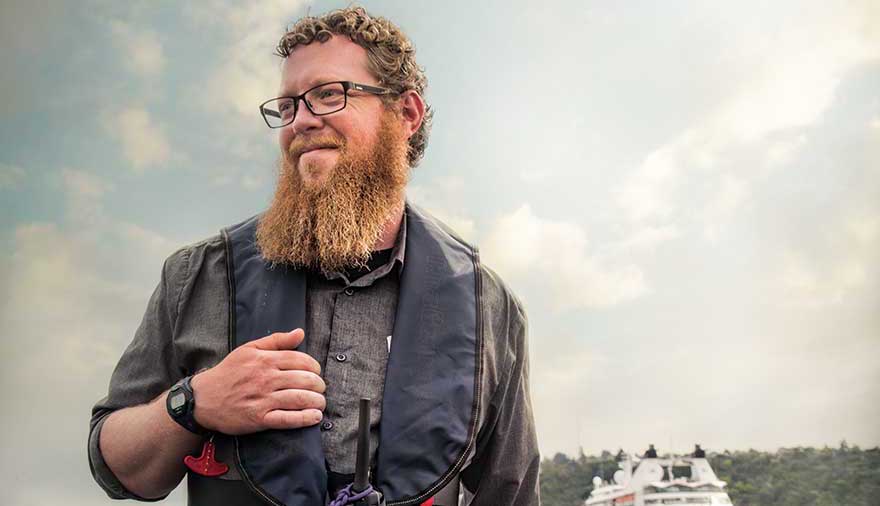
On select Windstar voyages, satisfy your curiosity and enhance your understanding of the local culture by listening to our onboard lecturers. We’ve curated a group of speakers designed to bring you an insider’s perspective on a multitude of intriguing topics. Listen raptly as your voyage becomes more than just a vacation – and a thought-provoking exploration of enchanting lands.
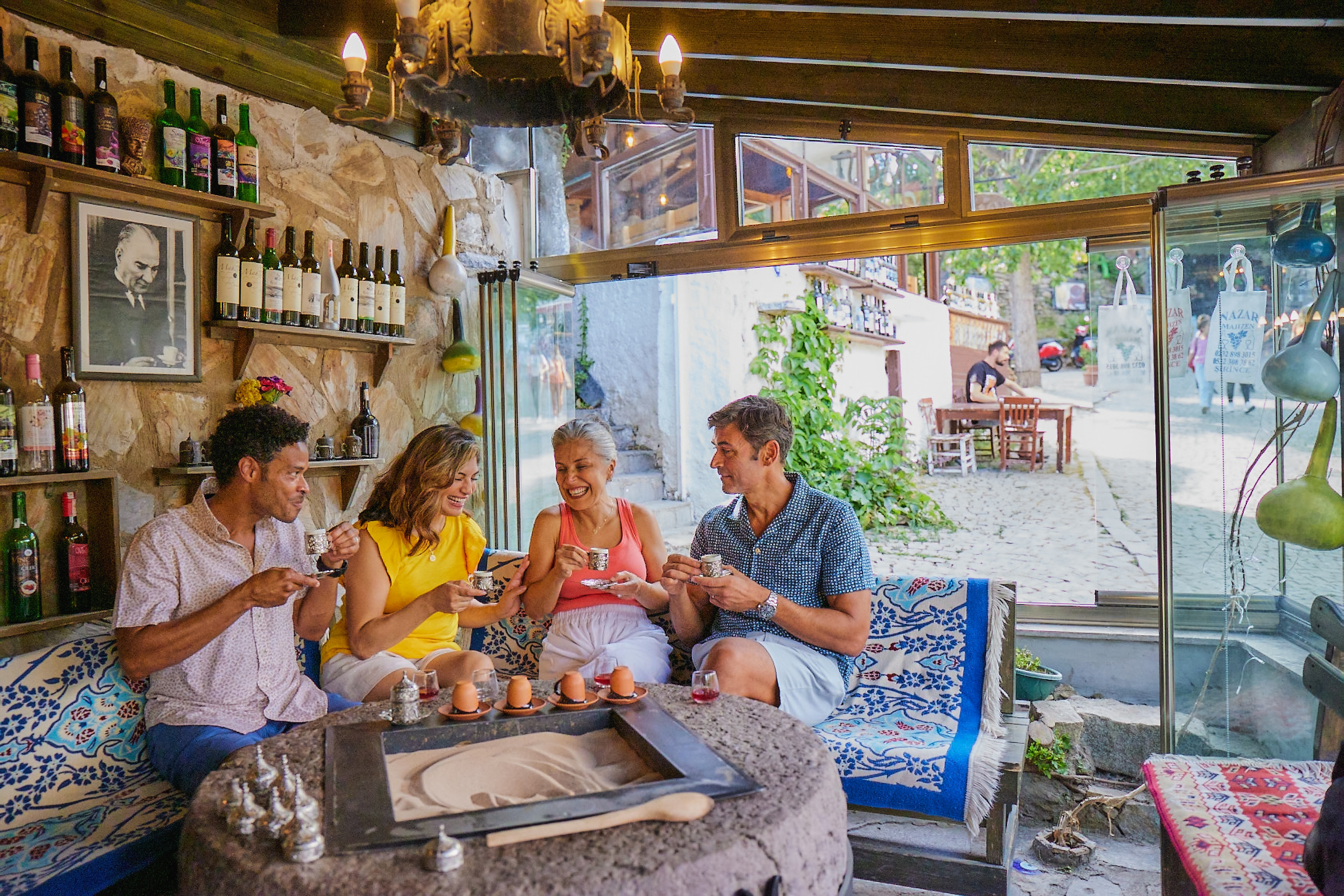
Windstar Signature Expeditions is an immersive program that features 8 expert guides who stay on board throughout the voyage, giving informative talks and taking guests on optional adventures by foot, by kayak, or by Zodiac boat – sometimes launching straight from the ship in remote places like Misty Fjords and Kenai Fjords. It’s Alaska at its most authentic, exciting all your clients’ senses to its magnificence.
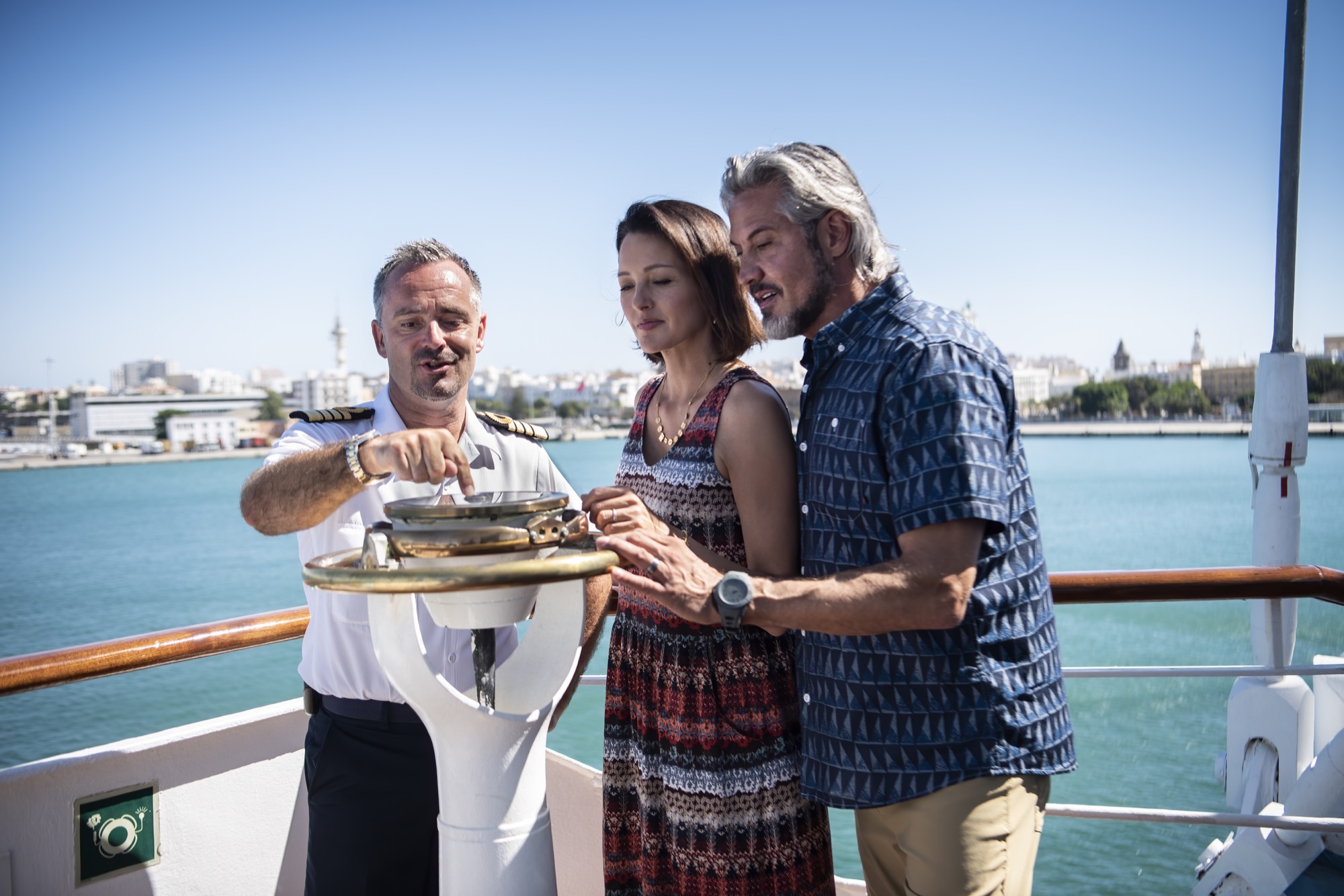
Delight your palette with onboard cooking demonstrations featuring James Beard Foundation chef recipes. From wild striped bass with tomato sage “fondue” to lobster risotto, our Windstar chefs will take your taste buds on a journey through local cuisine. For a special tantalizing treat, join Windstar on one of our voyages in the James Beard Foundation Culinary Cruise Collection, where a James Beard Foundation chef will show you how to elevate your own culinary skills. It’s a taste of enrichment you’ll never forget.
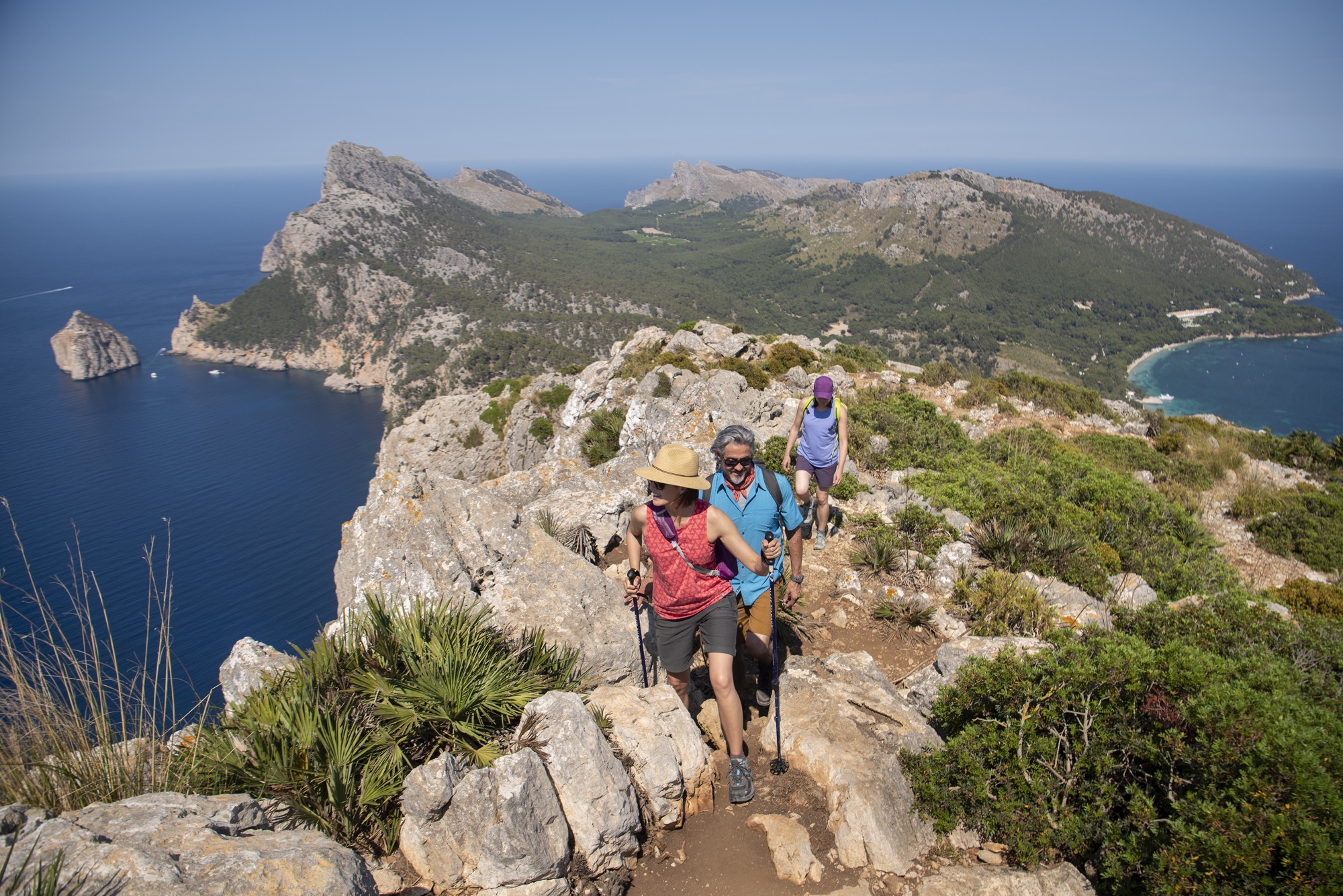
Wine tastings, SCUBA diving, tours with locals and more — Windstar offers a variety of unique excursions that will add more depth and immersion to every day of your journey. Each meticulously planned excursion meets our highest standard of quality in safety and professionalism. Ensure your peace of mind knowing that you’ll always make it back to the yacht on time.
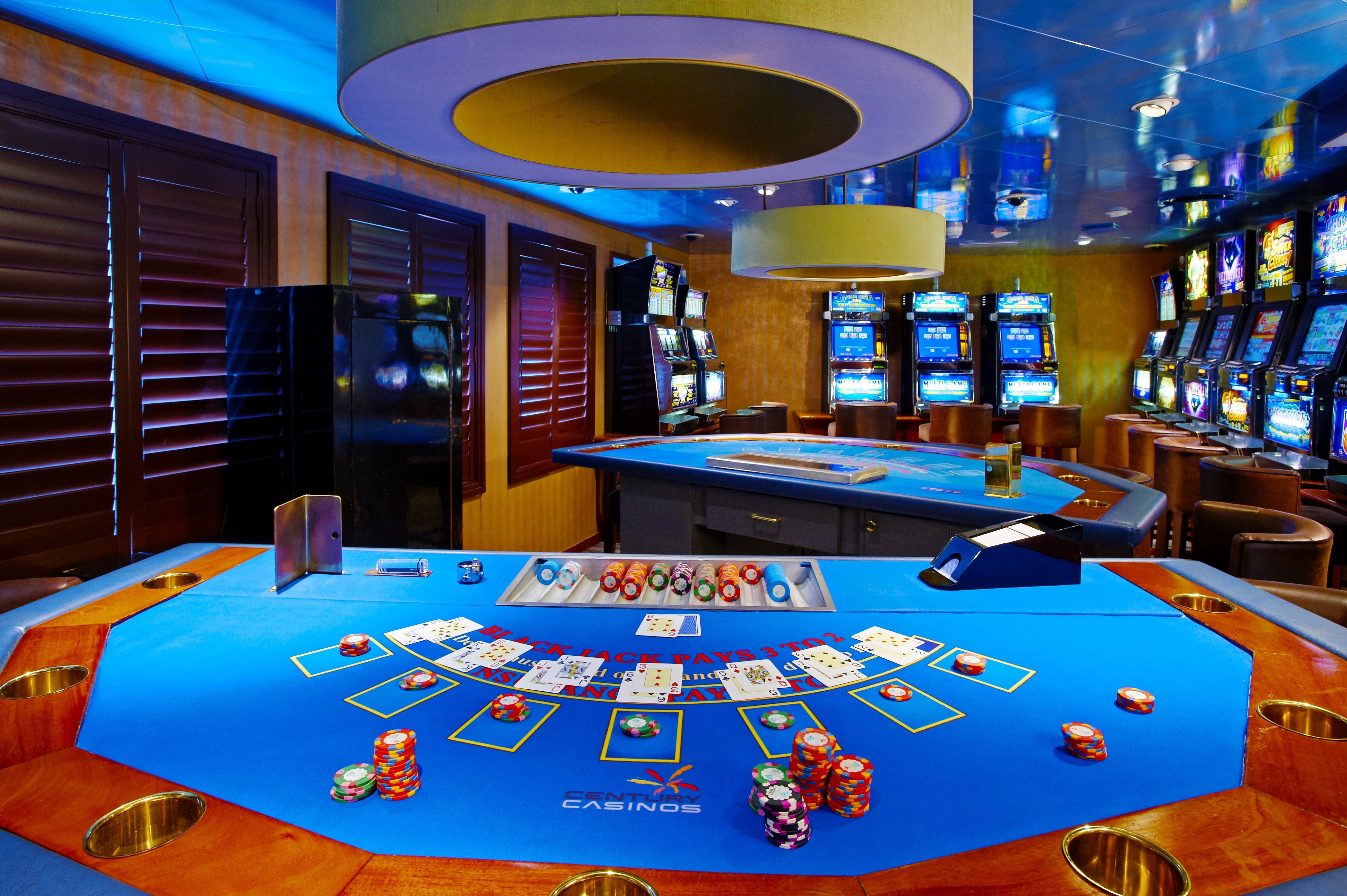
Onboard entertainment facilities include: Sun Deck, Library, Casino, The Lounge, and Signature Shop.
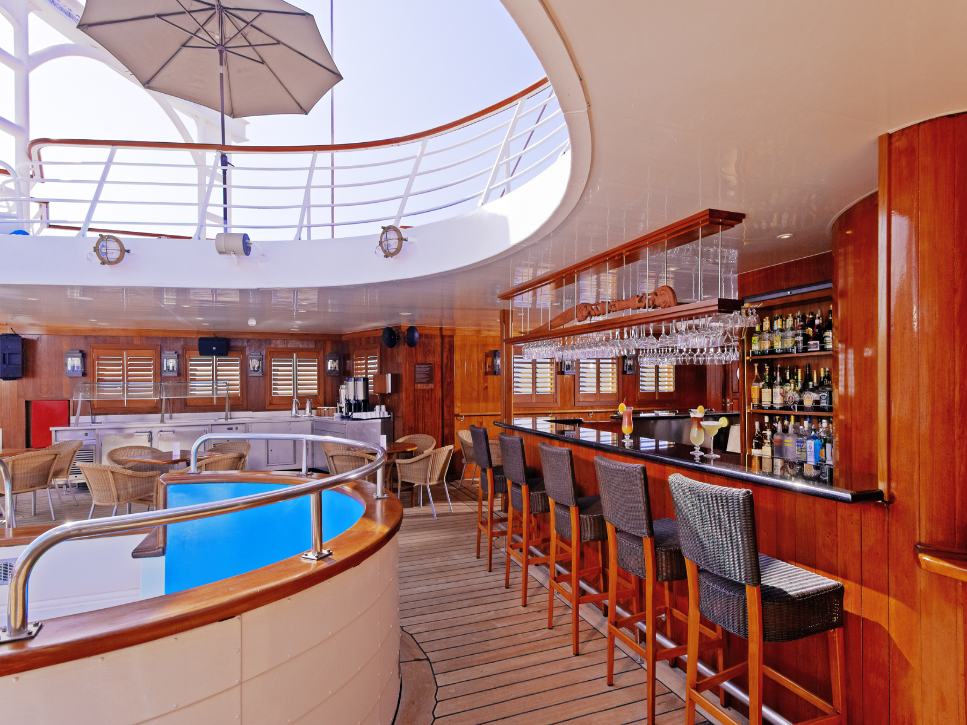
The Pool Bar can be found on Deck Four.
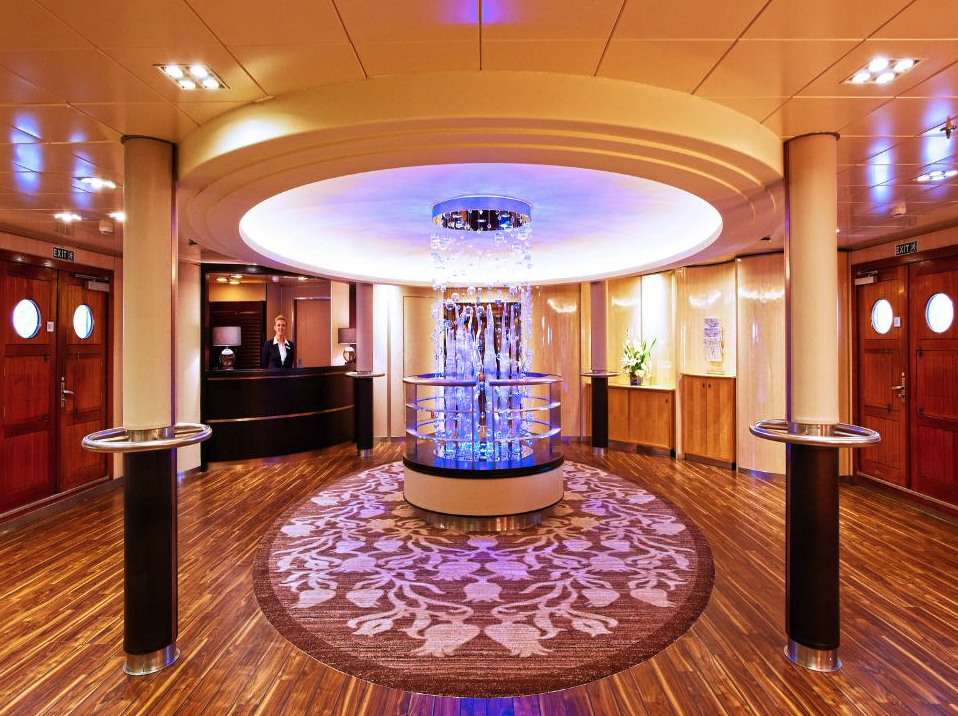
The Reception can be found on Deck Three.
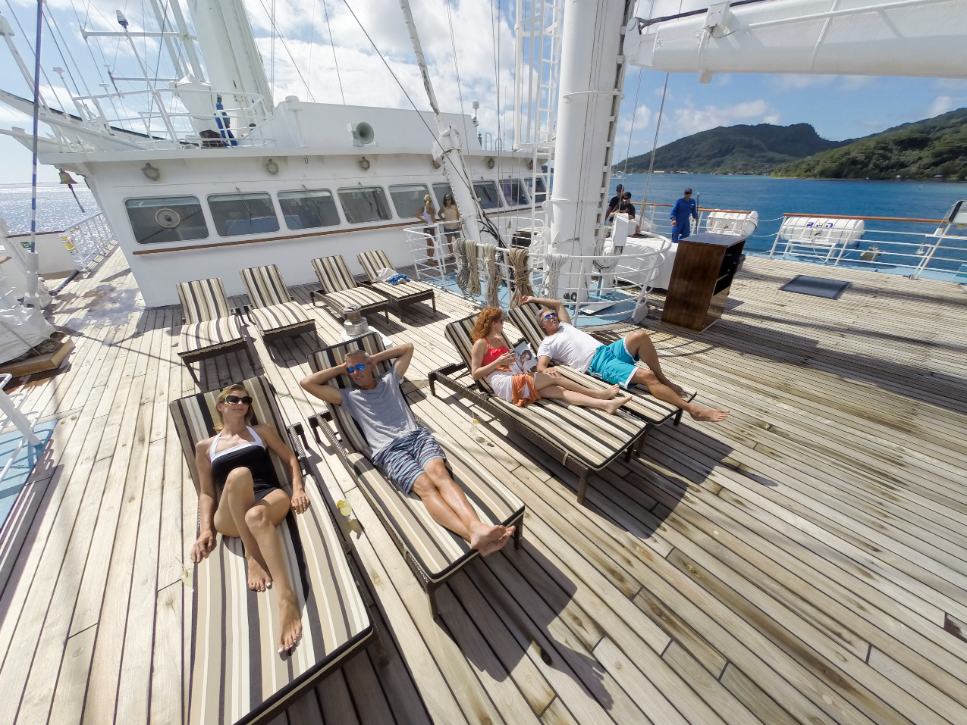
Sun Loungers can be found on Deck Four.
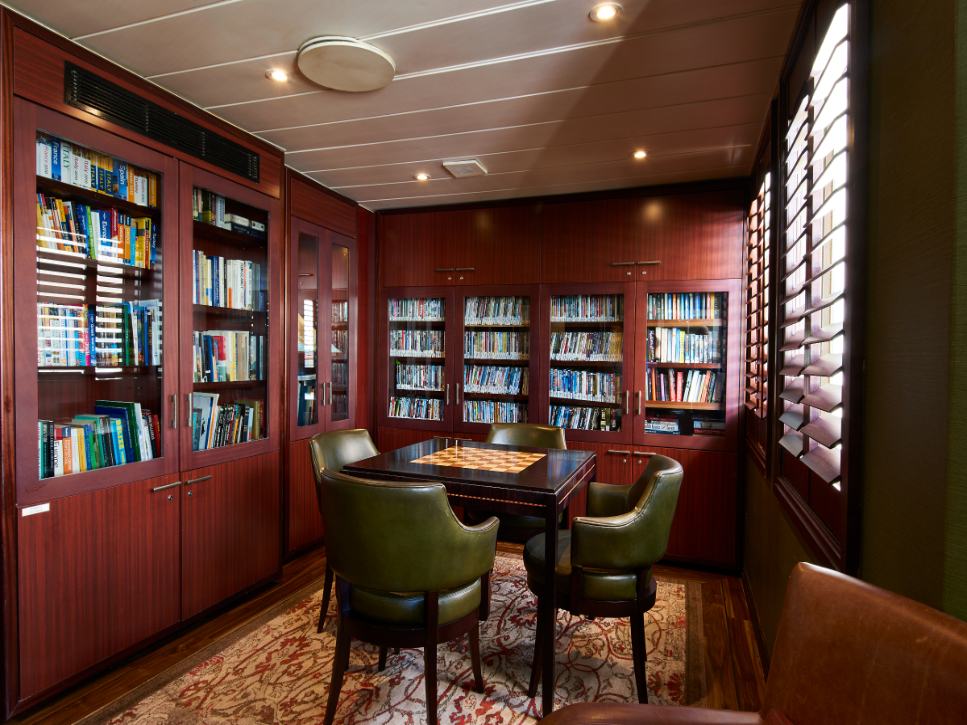
The Library can be found on Deck Three.
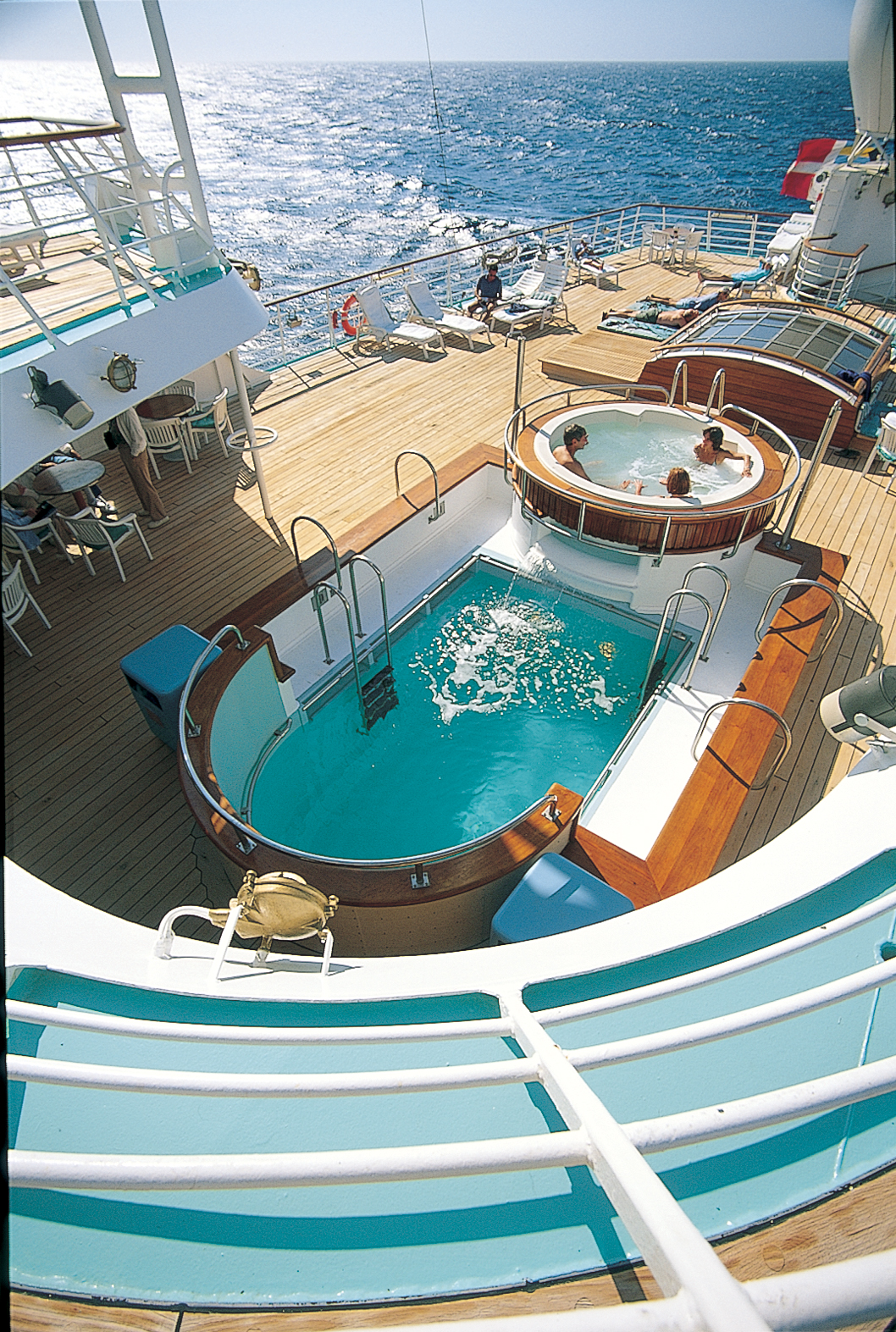
Onboard Health & Fitness facilities include a whirlpool, fitness centre, swimming pool and watersports platform.
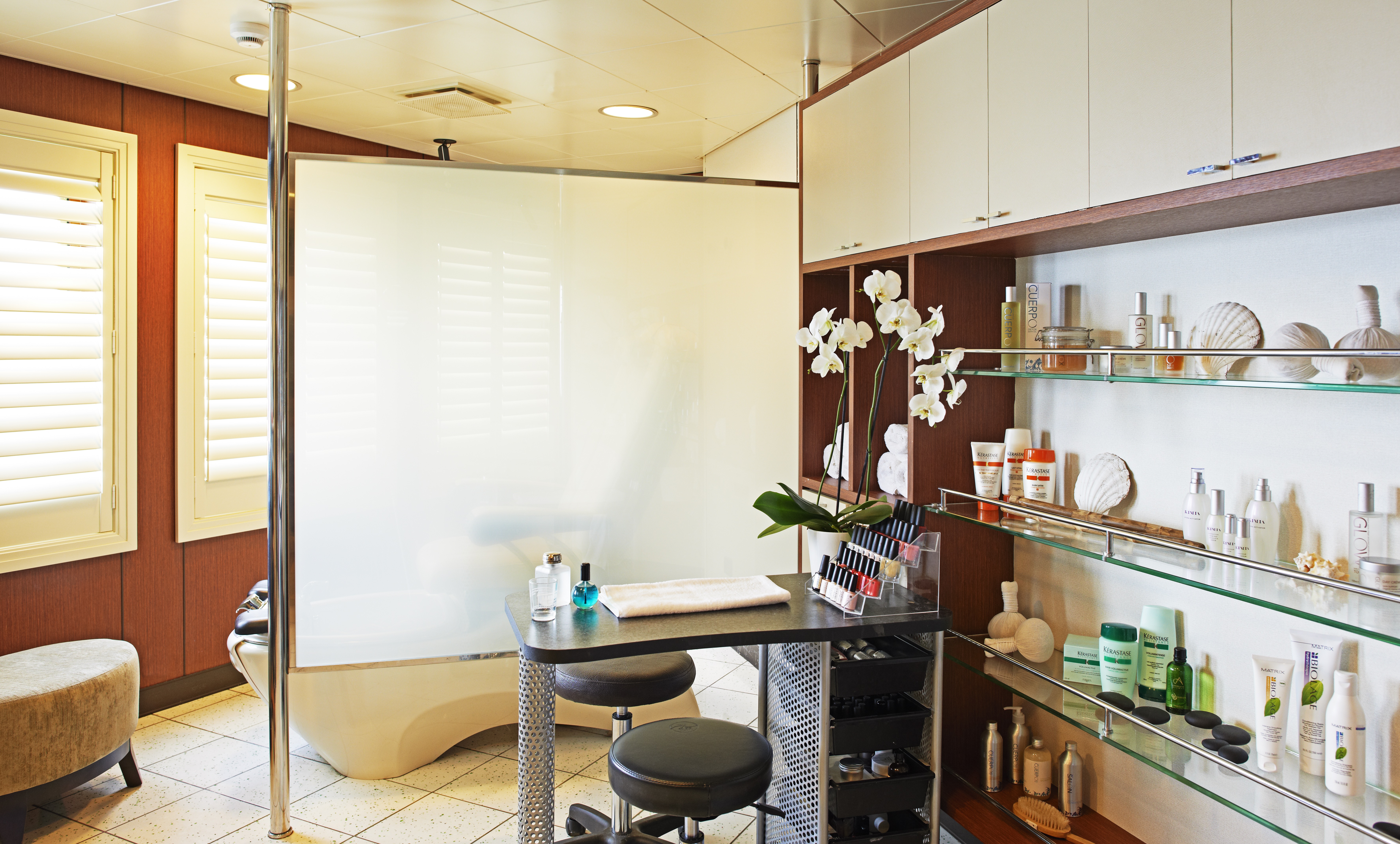
As you enter the hushed atmosphere of the newly-expanded WindSpa, you’ll feel every last care gently melt away. Maybe you’ll try a Hydralift facial or a new colour on your toes. Maybe you’ll surrender to the transformative power of a relaxing massage. With one of the highest crew-to-passenger ratios at sea, you will find yourself in the enviable position of never having to lift a finger.
The crew is happy to do whatever they can to make your time onboard as pampered as possible. Please book spa appointments with the hotel manager once you’ve boarded your yacht.
The less you bring the better. We suggest clothes that are light, cool, and made of natural fabrics like cotton and silk. You may wish to bring warmer clothing (layers are best), if you are traveling on an Ocean Crossing or an autumn Mediterranean cruise.
The Dress Code – from 7 am – 6 pm guests are welcome to dress as they please with the exception of no swimwear in all public lounges and restaurants and no clothing with offensive language or graphics that distract from the comfort and well-being of others. The general shipboard style is elegant, but relaxed including jeans and Bermuda/ walking shorts.
In the evening – after 6 pm when dining in Amphora, Stella Bistro or Cuadro 44 by Anthony Sasso, the dress code is country club-type clothing. For men – nice slacks, polo shirts, button down shirts, shoes other than athletic shoes. Designer denim jeans without rips or holes or are multi-colored are also acceptable. Sport coats are optional. Ties are not needed. For women – nice pants, skirts, tops, casual dresses, sundresses, nice sandals or casual shoes and designer denim dress jeans not ripped or multi-colored or having holes. Blazers are optional.
No assigned seating in Amphora or Veranda restaurants. And what can be more casual than merely signing for onboard purchases? You will feel like this is your ship, your personal yacht. The environment inspires the attitude. Reservations are required for Candles and can be made on board.
For those guests traveling to Alaska, it’s important to wear the right gear. We have partnered with the leading expedition outfitter to offer an online Alaska clothing and accessories service that ships directly to your ship. You’ll find all the right gear for Alaska, packing lists, clothing tips and our limited-edition Alaska inaugural season jacket here..
Passengers under 21 years of age must be accompanied by a parent, guardian or chaperone who is at least 25 years old. One adult chaperone is required for every 5 people under 21. Parents, guardians, and chaperones are responsible for overseeing the onboard conduct of minors. Alcoholic beverages will not be served to guests under age 21.
Windstar Cruises is unable to accommodate children under eight (8) years of age. Guests under 21 years of age must be accompanied by a parent, guardian or chaperone in their stateroom or suite who is at least 25 years old; one adult (age 25 or older) chaperone is required for every five (5) people under 21.
Windstar does not discriminate against persons on the basis of disability. We seek, to the extent feasible, to accommodate the needs of persons with disabilities. There are no elevators on Wind Star and Wind Spirit nor were the ships originally constructed to be wheelchair accessible. As a result, these ships may be unsuitable for people relying solely on wheelchairs. The other yachts are equipped with elevators, but staterooms on Wind Surf are not wheelchair accessible. Also note, there is no elevator access to board the ship. Star Pride, Star Breeze, and Star Legend have modified wheelchair accessible suites available.
Certain ports require the ship to anchor; in this case guests must be ferried into port. Service Dogs are permitted onboard ships if prior arrangements have been made at time of booking. In limited situations where an individual with a disability would be unable to satisfy certain specified safety and other criteria, even when provided with appropriate auxiliary aids and services, we may find it necessary to ask the individual to make alternative travel arrangements. It is essential that Windstar is notified of any special medical, physical or other requirements you may have at the time of booking.
While all non-alcoholic beverages are complimentary, you may enjoy a pre-dinner cocktail under the setting sun or a champagne toast at the evening Sail Away with our beverage packages for wine, beer, cocktails and more. Find the perfect wine pairing with your meal and then end the night sipping scotch as you contemplate the stars.
Topmast Discoveries Beer & Wine Package – $49 per person per day An extensive package of diverse and intriguing wines from traditional European winegrowing terroirs to New World regions. Includes domestic and imported beer and 33 varieties of wine by the glass.
Captain’s Exclusive Beverage Package – $59 per person per day The ultimate beverage package and the perfect way to try new drinks for a bit of added adventure. Includes all domestic and imported beers and 33 varieties of wine/sparkling/champagne by the glass PLUS cordials, liqueurs, apertifs, cocktails and even mini bar items. (Cocktails based on house & select brands)
The All-In Package – From $79 per person per day. Have it all by making it an all-inclusive voyage with unlimited beer, wine & cocktails, unlimited Wi-Fi and gratuities, including the 15% beverage service charge. A convenient bundle that saves time and money, pays most of your expenses upfront and avoids the European VA Tax when pre-purchased. The All-In Package is sold per person and must be purchased up to 7 days prior to departure at $79.
The Topmast, Captain’s Exclusive and $89 All-In Packages are sold per person and must be purchased in advance or during the first 2 days of your cruise and for the full duration of the cruise. Prices for the Topmast and Captain’s Exclusive Packages do not include the standard 15% beverage service charge. Package prices are inclusive of applicable taxes. The minimum drinking age aboard Windstar Cruises is 21 years old.
Laundry service is provided on board at a nominal charge. Dry cleaning is not available. Laundry Service Packages must be added by the first day of the cruise and will be priced by the total number of cruise days. Pricing is inclusive of applicable taxes.
- All meals in all venues at all times, including room service menu available 24 hours
- All non-alcoholic beverages, including cappuccino, espresso, and other specialty non-alcoholic drinks
- Welcome cocktails at reception
- All onboard entertainment
- Unlimited use of Fitness Center
- Unlimited use of all water sports equipment
- Informative nightly port talks and destination briefings
Here at Windstar we are committed to offering our guests healthy food selections. We offer vegetarian selections and lighter fare options, seeking to provide the freshest, top quality foods handled with the utmost care. If you have food allergies or special dietary needs, there are several ways to notify us prior to boarding the ship.
It’s important to let us know about your special request when you book your cruise to help us plan and prepare for your meals. Your travel professional will enter this information in Special Requests. It is then noted on your booking and your ship will be notified, although it will not appear on your invoice or in My Windstar.
Special Request Dietary Needs include:
- Alcohol Free
- Celiac
- Dairy Free
- Diabetic – Diet Controlled
- Diabetic – Insulin Controlled
- Food Allergy
- Gluten Free
- Lactose Intolerant
- Low Carbohydrate
- Low Cholesterol
- Low Protein
- Low Sodium
- Other Dietary
- Sugar Free
- Vegan
- Vegetarian
- Wheat Free Diet
Unfortunately we are unable to accommodate Kosher or Halal meals. If you have specific dietary needs– such as – lactose intolerant requiring almond milk – please complete a Special Requirements Information Form. Return this information via:
1. Mail to Windstar Vacation Planning at 2101 4th Ave., Suite 210, Seattle WA 98121
2. Fax to 206-733-2790
3. Call 866-568-0982 to speak with a Vacation Planner in person
4. Send an email to info@windstarcruises.com
When you embark the ship please feel free to ask to speak with the Executive Chef about your specific request.
If you have any additional questions or concerns please call us during business hours at 866-568-0982.
Smoking or vaping is not permitted in any of the staterooms, suites, or public spaces, including all restaurants and corridors. Smoking and vaping is permitted on the outside decks in designated smoking areas only. Smoking cigars is permitted in a specific designated area on each yacht, however, only sold on board the Cigar Room of Wind Surf.
Windstar Cruises offers full internet capabilities, depending on course and position of the ship, as well as wireless internet service on all ships. Wi-Fi access is possible in most public areas, staterooms, and suites.
Internet Usage Plans
The Email Plan $60
This plan gives you 200 MB of data to use during your cruise. This plan is recommended for people who will be checking email and doing very limited browsing. The estimated minutes range from 15 to 60.
The Surfing Plan $120
This plan gives you 500 MB of data to use for additional browsing and small file transfers (such as posting pictures to a social media site). The estimated minutes range from 90 to 360 (approximately 5 hours).
The Unlimited Plan
Unlimited Internet Package
- 7 Day Cost $250
- 8 Day Cost $280
- 9 Day Cost $315
- 10 Day Cost $350
- 11 Day Cost $385
- 14 Day Cost $490
- 15 Day Cost $525


- Bridge
- Veranda/Candles
- Pool/Pool Bar/Whirlpool

- Amphora Restaurant
- Star Boutique
- Reception
- Library
- WindSpa
- Lounge
- Yacht Club Café

- Watersports Platform
- Fitness Centre
- Category A Cabins
- Category AX Deluxe Cabins

- Owner’s Suite
- Category B Cabins
- Category BX Deluxe Cabins

